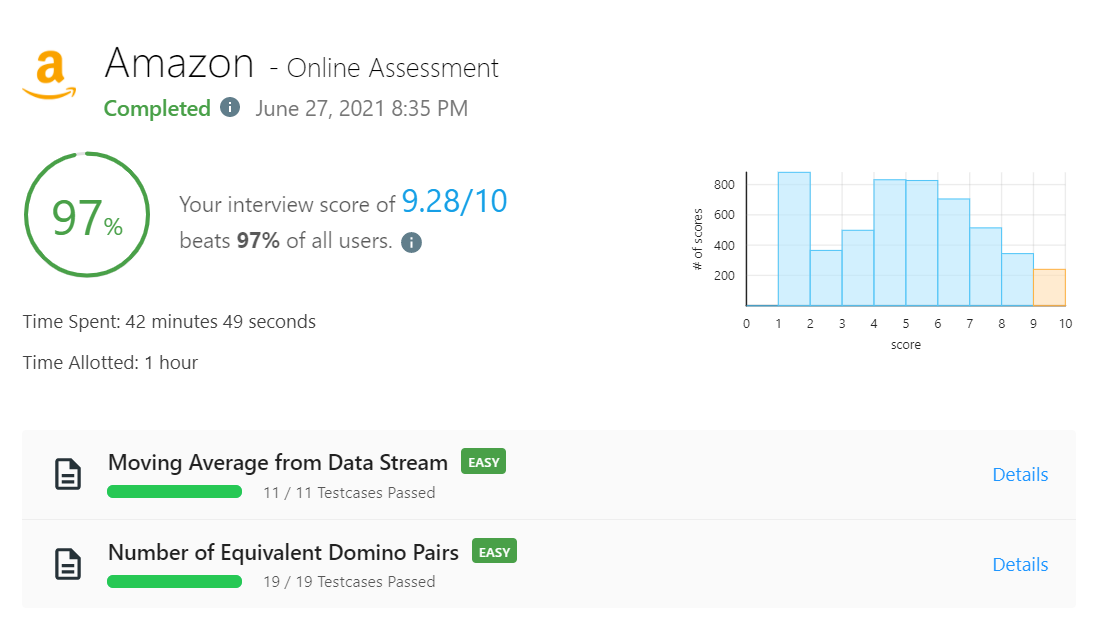
와 이렇게 좋은 점수 처음 받아봐요
이렇게만 하자 마존아..^^
346. Moving Average from Data Stream
class MovingAverage {
/** Initialize your data structure here. */
Queue<Integer> q;
int nums;
double total;
int len;
public MovingAverage(int size) {
q = new LinkedList<Integer>();
nums = 0;
total = 0.0;
len = size;
}
public double next(int val) {
if (q.size() >= len) {
int gone = q.poll();
total -= gone;
nums--;
}
total += val;
nums++;
q.add(val);
return total / nums;
}
}
/**
* Your MovingAverage object will be instantiated and called as such:
* MovingAverage obj = new MovingAverage(size);
* double param_1 = obj.next(val);
*/Runtime: 88 ms, faster than 48.04% of Python3 online submissions for Moving Average from Data Stream.
Memory Usage: 17.2 MB, less than 83.85% of Python3 online submissions for Moving Average from Data Stream.
Queue를 사용해서 사이즈를 계쏙 보면서 만들어줬읍니다
루션이
class MovingAverage {
int size, head = 0, windowSum = 0, count = 0;
int[] queue;
public MovingAverage(int size) {
this.size = size;
queue = new int[size];
}
public double next(int val) {
++count;
// calculate the new sum by shifting the window
int tail = (head + 1) % size;
windowSum = windowSum - queue[tail] + val;
// move on to the next head
head = (head + 1) % size;
queue[head] = val;
return windowSum * 1.0 / Math.min(size, count);
}
}Runtime: 10 ms, faster than 45.53% of Java online submissions for Number of Equivalent Domino Pairs.
Memory Usage: 48.1 MB, less than 75.89% of Java online submissions for Number of Equivalent Domino Pairs.
호랑이 담배피던 시절에 배운 circular array...
여기서 쓰면 간지날 것 같네요
1128. Number of Equivalent Domino Pairs
class Solution {
public int numEquivDominoPairs(int[][] dominoes) {
Map<Integer, Integer> m = new HashMap<Integer, Integer>();
int total = 0;
for (int[] d : dominoes) {
if (! m.containsKey(d[0]) && ! m.containsKey(d[1])) {
m.put(d[0], d[1]);
m.put(d[1], d[0]);
} else if (! m.containsKey(d[0])) {
m.put(d[0], d[1]);
if (m.get(d[1]) == d[0]) {
total++;
}
} else if (! m.containsKey(d[1])) {
m.put(d[1], d[0]);
if (m.get(d[0]) == d[1]) {
total++;
}
} else if (m.containsKey(d[0]) && m.containsKey(d[1])) {
int val1 = m.get(d[0]);
int val2 = m.get(d[1]);
if (val1 == d[1] || val2 == d[0]) {
total++;
}
} else {
break;
}
}
return total;
}
}처음에는 진심 개뻘짓 했읍니다
모든 케이스 나눠주려고 했는데 (문제 이해 못함)
class Solution {
public int numEquivDominoPairs(int[][] dominoes) {
Map<Integer, Integer> m = new HashMap<Integer, Integer>();
int total = 0;
for (int[] d : dominoes) {
int key = Math.min(d[0], d[1]);
int val = Math.max(d[0], d[1]);
if (m.containsKey(key)) {
if (m.get(key) == val) {
total++;
}
} else {
m.put(key, val);
}
}
return total;
}
}정신 차렸다 생각하고 다시 풀었는데 또 문제를 잘못 이해했다는점...^^
class Solution {
public int numEquivDominoPairs(int[][] dominoes) {
Map<Integer, Integer> m = new HashMap<Integer, Integer>();
int total = 0;
for (int[] d : dominoes) {
int key = Math.min(d[0], d[1]);
int val = Math.max(d[0], d[1]);
int value = key * 10 + val;
total += m.getOrDefault(value, 0);
m.put(value, m.getOrDefault(value, 0) + 1);
}
return total;
}
}Runtime: 10 ms, faster than 45.53% of Java online submissions for Number of Equivalent Domino Pairs.
Memory Usage: 48.1 MB, less than 75.89% of Java online submissions for Number of Equivalent Domino Pairs.
다시 쉬맵이로 돌아와서 풀기~
이거 문제 워딩이 넘 빡치게 돼있었어요
